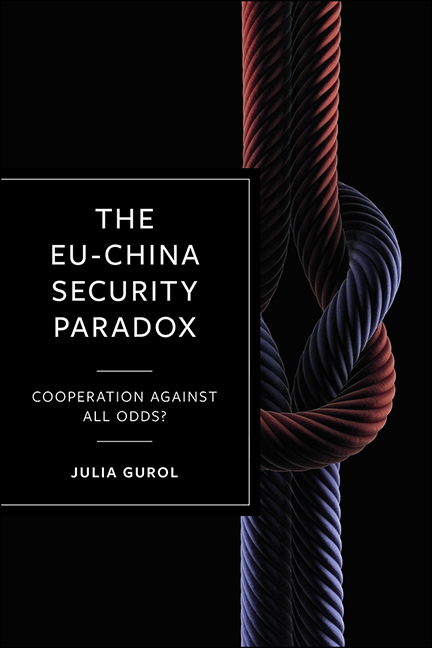Book contents
- Frontmatter
- Contents
- List of Figures
- List of Tables
- List of Abbreviations
- About the Author
- Acknowledgements
- 1 The EU and China in a Changing International Environment
- 2 Analytical Framework: Towards Multidimensionality
- 3 The EU’s and China’s Foreign and Security Policy Principles
- 4 The EU and China on the Global Stage: Interests and Interdependence
- 5 Framing and Perceptions in EU–China Security Relations
- 6 EU–China Relations on Anti-Terrorism
- 7 EU–China Relations on Maritime Security and Anti-Piracy
- 8 EU–China Relations on Climate and Energy Security
- 9 The US: An Elephant in the Room for EU–China Security Relations
- 10 Conclusion and Outlook: The EU and China at a Crossroads
- Notes
- References
- Index
9 - The US: An Elephant in the Room for EU–China Security Relations
Published online by Cambridge University Press: 15 September 2022
- Frontmatter
- Contents
- List of Figures
- List of Tables
- List of Abbreviations
- About the Author
- Acknowledgements
- 1 The EU and China in a Changing International Environment
- 2 Analytical Framework: Towards Multidimensionality
- 3 The EU’s and China’s Foreign and Security Policy Principles
- 4 The EU and China on the Global Stage: Interests and Interdependence
- 5 Framing and Perceptions in EU–China Security Relations
- 6 EU–China Relations on Anti-Terrorism
- 7 EU–China Relations on Maritime Security and Anti-Piracy
- 8 EU–China Relations on Climate and Energy Security
- 9 The US: An Elephant in the Room for EU–China Security Relations
- 10 Conclusion and Outlook: The EU and China at a Crossroads
- Notes
- References
- Index
Summary
Introduction
While there is no essential reason for a global pandemic to forge geopolitical tensions, COVID-19 has accelerated a development that predates the outbreak of the pandemic (Zhao, 2020). Ever since the beginning of the Trump administration but also in light of the ravaging pandemic, the relationship between the EU and China has become increasingly overshadowed by US–China tensions, questioning the strategic EU–China– US triangle that once dominated political analyses. In the early post-Cold War years, the relationship between the three largest world powers seemed to be mutually beneficial. Over time, the EU has found itself increasingly stuck in the middle, between the US and China. This has intensified because of the US–China trade war, putting the EU in a tough spot strategically (Chun, 2020). Both the US and China are competing for its favour, and the EU as such is struggling to choose between Washington and Beijing. Maintaining neutrality is not feasible for Europe, as both sides are actively seeking its support. While traditionally, the EU, as well as its individual member states, would have been inclined to side with the US, the somewhat protectionist foreign policy of the Trump administration has forced the EU to seek cooperation with China more often. The Trump administration's hostile behaviour towards the EU has made it increasingly difficult for EU policymakers to maintain a balance between the US as a withdrawing hegemon and China as an emerging leader (Montesano, 2020). This was accelerated by the US’ disorderly retreat from global governance (Meunier, 2020), which required a reconfiguration of the positions of the EU and China as the two most important remaining actors in global governance. At the same time, as mentioned before, tensions have increased with China over questions of a normative nature (Goulard, 2020).
In the context of COVID-19, relations between China and the US have further worsened, and the risk of the EU being caught in the middle of these two great powers has increased. By now, the disputes between Beijing and Washington are far greater than mere trade skirmishes and touch upon questions of global order, the future of multilateralism, and international rules, norms and procedures (Men et al, 2020).
- Type
- Chapter
- Information
- The EU-China Security ParadoxCooperation against All Odds?, pp. 137 - 148Publisher: Bristol University PressPrint publication year: 2022



